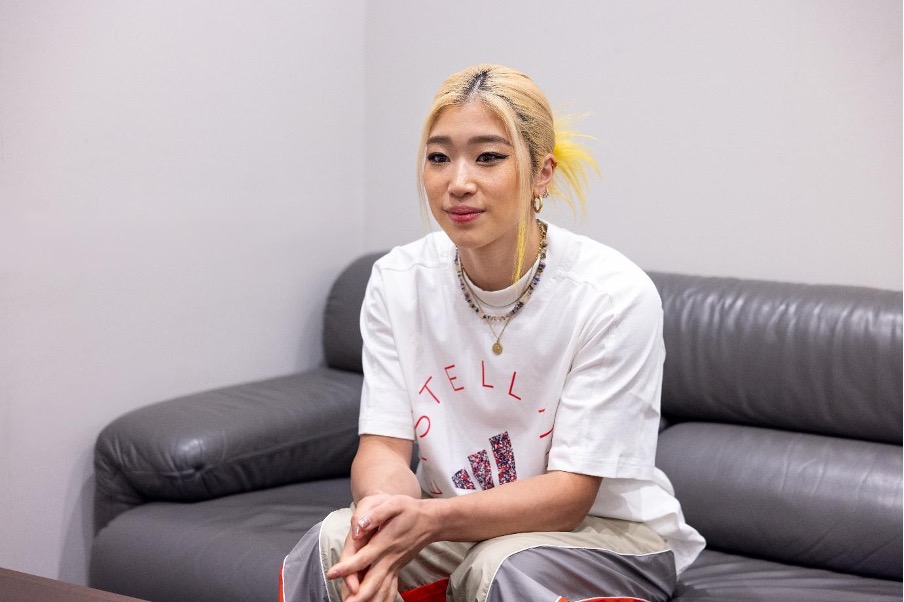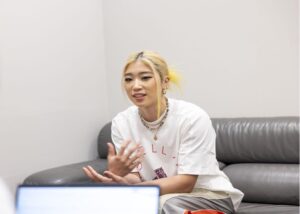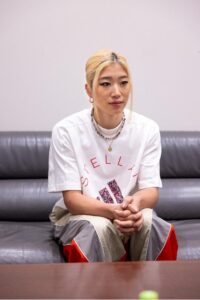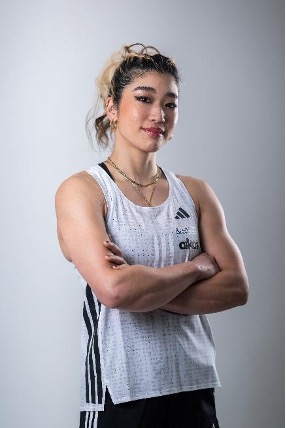INTERVIEW
in JAPAN

SPOGOMI, a fusion of sports and trash-picking, enters its World Cup year in 2025. By turning the act of picking up trash on streets and in the ocean into a sport to be enjoyed competitively, this initiative helps clean both town and sea—and Olympian Miho Nonaka has once again taken on the role of ambassador, following the previous tournament. We asked her, both as a climber who has always competed in close connection with nature and as an individual belonging to the next generation, what she hopes to inspire through SPOGOMI.

SPOGOMI is a completely new sport born in Japan, transforming traditional volunteer litter-picking into a competitive event by incorporating the essence of sports. Since its start in 2008, tournaments and community events have been held both in Japan and abroad, growing into an activity embraced by a wide range of people—from everyday citizens to companies, local governments, and even Olympians.
The refreshing feeling of picking up trash “enjoyably” and “seriously” is possible precisely because it is a sport. At the same time, it raises awareness of environmental issues that are part of everyday life—truly a win-win initiative.
Olympic sport climber Miho Nonaka serves as an ambassador for SPOGOMI. We interviewed her on the day of the Tokyo STAGE, which determined the city’s representatives for the SPOGOMI World Cup. Despite the intense heat, Nonaka attended and cheered on the participants.
– Hello. Ms. Nonaka, you’ve become an ambassador once again following the 2023 World Cup. What was the deciding factor for you?
As a professional climber, I not only compete in sport climbing events but also climb natural rock faces in the mountains. And whenever I go into such natural environments, one thing I always do is pick up any trash I find. It’s the same when I go to the beach in my private life—I’ve made it a habit since childhood to always pick up litter before leaving.
Because of this, I’ve always felt from the heart that the simple act of picking up trash in daily life is extremely important. So when I heard about SPOGOMI, I thought, “This is a perfect match,” and I truly felt that from the bottom of my heart.
What makes SPOGOMI so appealing is that it defines trash-picking as a sport—and above all, that people enjoy doing it. The aspect of facing it seriously and wholeheartedly, as in any sport, is incredibly attractive to me.

At the Tokyo STAGE held on July 26, 2025, Nonaka presented certificates to the prize winners
I believe that each participant’s small actions—carried out seriously yet joyfully—can change the world in a big way, and that’s exactly what this activity makes possible.
— Thank you. SPOGOMI, being a sport, “cleans towns and oceans through competition.” Since it involves bending and walking, it also has real exercise benefits. How did you feel when you took part yourself, Ms. Nonaka?
It truly feels like killing two birds with one stone: the earth becomes cleaner, and you feel like you’re improving yourself too. The refreshing feeling you get after picking up trash is probably the same as the satisfaction of working up a sweat in sports—so you experience a double sense of refreshment.
Since becoming a SPOGOMI ambassador, I’ve become more conscious of waste issues and the environment. In May this year, I opened a climbing gym called “Next Gen” in Niiza, Saitama, and when building the facility, I made it a priority to use environmentally friendly and renewable materials. That decision wasn’t just because I had been personally picking up litter, but rather because my involvement with SPOGOMI made me determined to incorporate those choices.
At this gym, we have a policy of not installing trash bins—so no waste is produced. We also decided not to have vending machines, since they usually come with disposal bins for empty containers. That ends up signaling “this is a place where you can throw things away,” so we chose not to install them at all. Instead, we installed a purified water dispenser, so everyone can bring their own bottles and enjoy as much fresh water as they like.
— Building a gym entirely at your own expense while still competing made big news. What goals did you have in mind?
Even while I’m still actively competing, I’ve devoted my whole life to climbing, having started at the age of eight. Climbing has given me so much, and I felt a strong desire to give back properly.
In fact, there are many incredibly strong kids in the current Japanese climbing scene. Japan as a whole is very strong, and I don’t want this positive momentum to be lost. Of course I’m still an active competitor now, but one day I’ll take on the role of raising the next generation of climbers. When that time comes, I want to pass on everything I’ve felt so far—the true greatness of climbing as I see it. I hope to create opportunities—whether through places, challenges, or experiences—that can serve as a catalyst for others.

She says opening the climbing gym entirely at her own expense is “a reflection of her resolve.”
One reason I built one of the world’s largest walls in the gym was, above all, to secure a solid training environment for myself. That was a non-negotiable point. Covering all the costs myself simply came down to, “Once decided, there’s no turning back.” It was an expression of how serious I am about pursuing what I truly want.
— Your gym reflects your deep resolve and passion, while also being environmentally conscious. What kind of feedback have you received from users?
Whenever I visited other gyms in the past, unfortunately, I always noticed a lot of waste being produced. People probably don’t mean to, but they leave trash behind or drop it around. I wanted to avoid that at my gym—because if no one changes it, it just becomes an ingrained “norm.”
Since there are no vending machines, I ask people to “bring your own bottles,” and I feel the message of “no plastic waste will come from this gym” is being conveyed.
But when I take action, some people start to think, “Oh, so we should try not to create waste.” Then more people begin to take it personally, turning that awareness into knowledge and action—thinking, “I’ll try not to produce waste either.” And if that awareness shifts even slightly, those small actions connect and eventually lead to major change. I know this will take time, but it’s something I’m very mindful about.
— Perhaps the people who come to your gym will resonate with that and eventually form a community.
That was actually another goal I had in building the climbing gym, though from a different angle. I think communities are very difficult to create deliberately, but I hoped the gym could become such a place.
I have a vague image of building culture “from here,” so it would be ideal if more people with environmental awareness gathered.
Of course, some come to the gym because they’re interested in climbing, but it’s also fine if they come simply because they want to work out in an eco-friendly space—and if that eventually leads them to take an interest in climbing, that’s the best outcome. If that broadens the base, bringing more people into climbing while also increasing the number of people who care about the environment, I’d be truly delighted.
There’s a kind of social-experiment aspect too—at first, I was often asked, “Wait, you don’t have vending machines here?” Some users were unsettled by it, but little by little they started bringing their own bottles and using the water dispenser. Now, quite a few people are doing that.

— Ms. Nonaka, is there a reason why you came to think that way?
I think the fact that I’ve been in touch with nature since childhood plays a big part. Through climbing I’ve gone to the mountains, and I’ve often visited the sea I love—so seeing my favorite places polluted or the ocean water dirty with trash is simply very unpleasant.
So it really comes from a simple feeling: “I wish the destruction of nature could be stopped.” If you think about it plainly, trash that didn’t come from the sea floating there will never return to nature—it’s just not good, is it?
Climbing in particular is a sport where you engage directly with nature using only your body—it only exists because nature does. If mountains continue to be polluted, one day climbing will no longer be possible; and of course, the same goes for swimming in the sea. I believe sports are actually very closely connected to nature. Even with running, beneath the concrete roads there is soil—if that becomes polluted and disappears, and the earth deteriorates, we won’t be able to do anything. That’s exactly why we must not be on the side that causes pollution.
Just as we need to care for and maintain our own bodies, we must also care for the Earth, or it will wither away.
— “If we don’t care for it, it will wither.” That’s very clear. Finally, could you share the message you’d like to convey through SPOGOMI?
Each and every small action you take can bring about big changes in the world. It takes a long time to create real change, but I want people to realize that what seems small is actually a big action—and it would be wonderful if they could enjoy doing it.
You can do it because it’s fun—and that’s important. At my climbing gym “Next Gen,” I run a kids’ school, and children’s ability to absorb things is truly incredible. That’s why I always feel that my words have a huge impact on them.
So as I engage with younger generations, I consciously try to share my thoughts—like reducing waste and caring for the Earth—because children, who absorb things like sponges, can benefit from these ideas. At the same time, it means I need to be more mindful of my own words and actions.
I also believe SPOGOMI should grow much bigger. Couldn’t it even become an Olympic sport someday? For sports and activities to help change the global environment in the future, I’d like SPOGOMI to reach that level of recognition. And wouldn’t that be exciting if it did?

The key to change is “acting the moment you think of it.” Her determined gaze is truly strikin.
“With small actions, we can change the world. What matters is to keep going while enjoying it,” Nonaka says with resolute eyes, adding, “Truly, the moment you think of it, you should act.”
The fusion of sports and environmental protection is shaping the future—and at its center stands Miho Nonaka.

Miho Nonaka: Olympian (Sport Climbing)
(Career Highlights) Born May 21, 1997, in Toshima Ward, Tokyo Silver medalist at the Tokyo Olympics At age eight, she was taken by her mountaineer father to a climbing gym as part of training, which introduced her to climbing. At sixteen, she was selected for the Japan national team for the first time and made her world debut in the Lead World Cup. In 2016, she claimed her first victory at the Bouldering World Cup in Mumbai, and also won in Munich the same year, finishing second in the world rankings. In 2018, she became the overall season champion in the Bouldering World Cup for the first time.。In 2019, she achieved the triple crown in domestic competitions. In 2021, she won the silver medal in the women’s combined sport climbing event at the Tokyo Olympics, becoming the sport’s first-ever Olympic medalist. In 2024, she competed in her second consecutive Olympics in Paris.